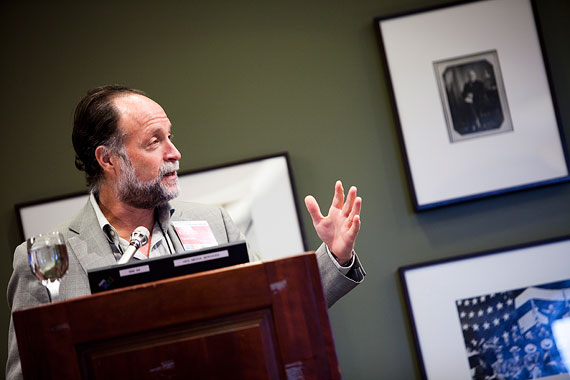Leading a nation long considered a model of economic dysfunction, Prime Minister Edi Rama of Albania has pushed for change since his election last year. And the change needed in his country is not the electioneering “change” promised by virtually everyone in U.S. politics, but sweeping reforms that remodel institutions and foster the economic revival taking hold oh-so-slowly in the former communist nation.
“We have … the youngest government in the history of Albania,” Rama said during a recent visit to Harvard. “My choice was to have ministers who have never been ministers.”
He added, “In politics, experience is what kills innovation and reform.”
But Albania isn’t relying on youth alone. Rama’s government is in the midst of a two-year project, funded by the Open Society Foundations, that partners it with Ricardo Hausmann, a professor of the practice of economic development at Harvard Kennedy School, and with experts at the School’s Center for International Development (CID), which Hausmann directs.
“Their findings are helping us structure or restructure sectors or subsectors,” said Arben Ahmetaj, Albania’s minister of economic development, trade, and entrepreneurship. “We feel lucky, but the cooperation goes beyond traditional consultancy. It’s a partnership [for] development.”

For decades, Hausmann said, Albania was a European version of North Korea, isolated from the rest of the world under the dictator Enver Hoxha. After the fall of communism in 1992, the nation made a difficult transition to capitalism, marked by a proliferation of pyramid schemes whose collapse led to unrest in 1996 and 1997.
“There’s no reason in the world that the country shouldn’t have a per capita income like Greece or Italy except for the fact it’s been mismanaged for 60 years,” Hausmann said.
With the Harvard-Albania project just past the halfway point, Ahmetaj and Rama see progress — analyses performed, reforms under way, and a 26 percent rise in exports.
“It’s absolutely a fascinating and unique experience,” Rama said, “very much based on knowledge, innovation, dialogue, and — first and foremost — working together. It’s not experts on one side and pupils that have to follow on the other. It’s about … results.”
While it’s not unusual for Harvard faculty members to advise or even serve in government, the depth of the relationship in this case is striking, said Elaine Papoulias, executive director of the Minda de Gunzburg Center for European Studies and a former director of the Kennedy School’s Kokkalis Program on Southeastern and East-Central Europe.
Papoulias said the CID project with Albania is an extension of a relationship between Rama and Harvard that reaches back to the early 2000s, when Rama was mayor of the national capital, Tirana. A onetime artist who had lived for years in Paris, as mayor Rama demonstrated a flair for the dramatic. He painted drab downtown buildings pink, yellow, and green, and took aim at the problem of rampant illegal development, reclaiming land for the city and encouraging green spaces. He was a Time magazine European hero in 2005.
Rama’s first visit to Harvard was in 2003, when he was invited by Papoulias and the Kokkalis Program to participate in a mayors’ lecture series. The invitation stemmed largely from her observation of Rama’s “unique” and “authentic” leadership style, Papoulias said, one that set him apart from the region’s other political leaders.
“His leadership was an ethos that was not only new for Albania, but for all of the region, a region … that had too many leaders who desired only to produce followers,” Papoulias said.
Rama soon started thinking about the kind of technical expertise Albania needed, and began pushing talented young leaders to participate in HKS executive education programs, both in Cambridge and in Greece. Today, Papoulias said, a quarter of Rama’s cabinet has some sort of Harvard training.
With Rama’s election to prime minister, the time seemed right for a more formal relationship between his country and the University. Backed by the Open Society Foundations, Hausmann began a two-year project aimed at institutional and economic reform.
“HKS became active in Southeastern Europe starting in the late ’90s — a formative moment for this region,” Papoulias said. “The CID project in Albania is an evolution and deepening of Harvard’s involvement in this region, and demonstrates how impactful being at the right place at the right time in a country’s developmental trajectory can be.”
Hausmann, former planning minister for Venezuela, former chief economist for the Inter-American Development Bank, and an expert on developing economies, started the initiative with a trip to Albania to talk to government officials about priorities, and to examine growth challenges and opportunities.
An early priority was assisting in negotiations with the International Monetary Fund, which in February approved $457 million to help Albania meet its financial obligations while it undertakes reform. Hausmann also secured a World Bank grant so that six of the country’s ministers could attend an executive education program at HKS that month.
“The moment they got back they started to implement ideas they got in the course,” Hausmann said.